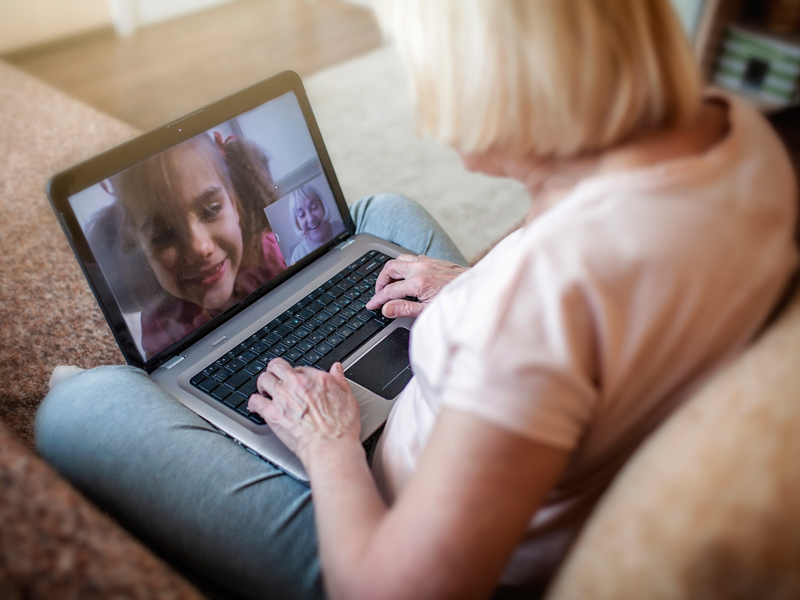Emotions come home to roost as Mississippians shelter in place

Profoundly sad. Disoriented. Worried sick. Afraid of the unknown. Frustrated.
Just plain weird.
They’re feelings we get during home isolation, and it’s perfectly normal to process those emotions, psychiatry experts at the University of Mississippi Medical Center say.

“The shocking part of all this is that we don’t have anything to compare this to,” Dr. Crystal Lim, a psychologist and associate professor in the Department of Psychiatry and Human Behavior, says of thousands of Mississippians voluntarily staying at home to decrease the transmission of highly contagious COVID-19.
Health care leaders have no exact timeline on how long safety will require sheltering away from other people and disruption of life, from work to family activities to simple pleasures that are now out of reach, Lim says.
“We’re all feeling so uncertain. That’s OK,” she said. “It can be scary, but what do we do with those feelings?”

“I can’t have total control over whether I get sick,” said Dr. Daniel Williams, associate professor and director of Psychiatry’s Division of Psychology. “I can do all the right things, and who knows what might happen? We don’t have perfect control.
“But, I do have some control over what I do with my day.”
Lim and Williams are offering Mississippians coping tips to help them stay on course and come out on the other side of the virus at a time when mental health has been placed in jeopardy.
Unplug from the news and social media, and instead check in a couple of times a day.
“There’s no reason to be on Twitter all day, or to have the news on in the background all day,” Williams said. “It creates fear and more uncertainty, and it’s not good for our mental health to be that connected.”
“This goes back to what you can control,” Lim said. “You can control your exposure to information. But, there are a lot of great stories of hope and of things that people are doing at this time. Create a balance.
Go back to the routine you had pre-virus.
“If I wake up when I wake up, and passively allow time to go by, I’m more likely to worry and have an impending sense of doom about the future, “ Williams said. “Get up when you normally do, and have an agenda and plan for what you want to accomplish that day.”
“When I’m working from home, I don’t stay in my pajamas,” Lim said. “I force myself to get dressed, because I’m used to being dressed. Have routines that are still part of your day. Think about how you can bring a little normal back into your experience.”
Find something to do that will not put you and others at risk, but is still part of your normal routine, she suggests. “It can be helpful to just go for a drive.
“What you don’t want to happen is not sleeping, or not eating regularly. A lot of times, we’re programmed to go to work or school. When we don’t have that external structure, we need to implement it at a time like this so that you are taking care of you.”
Be active, not passive.
“Watching the news is passive. The easiest thing to do is to be passive,” Williams said. “Let’s think of some active ways to pass the time that give us a sense of accomplishment or a sense of pleasure.”
“One active way to manage stress is to engage in physical activity you enjoy,” Lim said. “Even though gyms are closed, there are multiple ways we can be physically active at home, such as following exercise videos and programs from videos, the internet, and other social networking websites. This may be a good time to explore new ways to be physically active.”
You might have to push yourself away from what are bad coping strategies, Williams said. “Netflix doesn’t help me to get to a better place in a week, or in a month. Things that give you purpose and joy will pay a much bigger dividend.”
Find the silver lining in new actions, Williams suggests. “I’m seeing my kids way more than I used to see them. It’s fun,” he said. “We sat around playing Uno last night. If COVID-19 wasn’t happening, they wouldn’t want to sit around playing Uno with me.
“Pick up a new hobby, or go back to one that you cast to the side. There are ways that you can take advantage of the extra time, or the lack of places to go, that will benefit us.”
Social distancing doesn’t mean you can’t reach out to others and maintain bonds.
“Physical distancing doesn’t mean emotional distancing,” Williams said. “We should reach out to people for our well-being and the well-being of others. And, we can’t passively wait for people to reach out and support us.
“People get caught up in their own worries and concerns. They might not know how to reach out to you,” he said. “Let them know how they can be helpful.”
Connect with friends and family through Face Time or video chats, phone calls and letters, Lim said. “That’s a huge thing,” she said. “My grandmother is in her 80s. She knows how to Face Time. I’ve asked my neighbors if they need anything from the store. This is a way for me to check in on them, but also feel helpful.”
Channel worries into positive action.
Those who have lost jobs due to the pandemic, especially those in the restaurant business, are worried about paying their bills. “That’s a very real and serious problem right now,” Williams said.
“Try to actively work on problem solving. Reach out to the credit card companies and see if you can work something out. A lot of people are now eligible for unemployment benefits.”
Lim said her bank has sent information to customers offering to work with them. “See what flexibility they can offer you. That can help you manage your stress.”
Put into perspective fears that an unavoidable trip to the grocery store or pharmacy might end with you getting infected, Lim said. Face it actively by taking recommended precautions if you must leave your home.
“Know what you have control over,” she said. “You have control of following CDC recommendations on washing your hands, but you can only control what you can control. Be OK with that on some level.”
Look to the future, even though it’s challenging enough to deal with the present.
“What challenges will you face if you stay home four or six or eight weeks?” Williams asked “What will be your pressure points, and how can I proactively work on that so that I don’t have to scramble at the last minute?
“You can come up with better solutions than you would in a moment of panic, and can face situations knowing that you have done everything in your power to solve it,” he said.
Focus on the good you are doing, even if you’re not on the hospital or emergency response front lines.
“We have to remind ourselves of why it’s worth it to stay inside,” Williams said. “Our brain tells us what the short term is worth. We have to remind ourselves of the long-term benefits and the ultimate goal, and if we don’t keep that in mind, it will be frustrating and annoying to make these sacrifices.
“There are vulnerable people in your community. This is your gift to humanity, and to the community, that you are willing to engage in the sacrifices that health experts are asking of us.
“If you remind yourself about the personal connections, it’s easier to do this for a purpose and reason than for a rule.”


